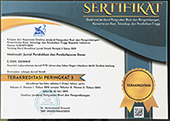Pengembangan Media Pembelajaran Pop-Up Berbasis Sains Kelompok B RA Raden Fatah Podorejo
Abstract
Keywords
Full Text:
PDFReferences
Aisyah, S. (2008). Perkembangan dan konsep dasar pengembangan anak usia dini. Jakarta: Universitas Terbuka.
Alma, B. (2009). Guru profesional menguasai metode dan terampil mengajar. Bandung: Alfabeta.
BUDIARTI, A. (2017). Pengembangan Media Pop-Up Book Pada Pembelajaran Subtema Keunikan Daerah Tempat Tinggalku Kelas IV Sekolah Dasar (other). University of Muhammadiyah Malang. Retrieved from http://eprints.umm.ac.id/35515/
Dewi, A. C. (2012). Meningkatkan Kemampuan Sains Anak Usia Dini Melalui Pembelajaran Berbasis Keterampilan Proses. Malih Peddas (Majalah Ilmiah Pendidikan Dasar), 1(2). https://doi.org/10.26877/malihpeddas.v1i2.301
Mulyasa, E. (2007). Kurikulum tingkat satuan pendidikan sebuah panduan praktis. Bandung: PT Remaja Rosdakarya.
Padmowihardjo, S. (2014). Psikologi Belajar Mengajar. Bandung: Universitas Terbuka
Sanaky, H. A. (2009). Media pembelajaran. Yogyakarta: Safiria Insania Press
Suprihatiningrum, J. (2013). Guru profesional: pedoman kinerja, kualifikasi & kompetensi guru. Ar-Ruzz Media.
Ward, H. (2010). Pengajaran sains berdasarkan cara kerja otak. Terjemahan Oleh Endah Sulistyowati Dan Agus Suprapto. Jakarta, Indonesia: Indeks.
Yulianti, D. (2010). Bermain sambil belajar sains di taman kanak-kanak. Jakarta: Indeks.
Yus, A. (2011). Penilaian perkembangan belajar anak taman kanak-kanak. Jakarta: Kencana.
DOI: https://doi.org/10.18860/madrasah.v11i1.6166
Copyright (c) 2018 Madrasah: Jurnal Pendidikan dan Pembelajaran Dasar

This work is licensed under a Creative Commons Attribution-NonCommercial-ShareAlike 4.0 International License.





